When I was younger and getting into comics, I loved WIZARD magazine. It had information on what was going on in the comics industry, and what the most popular comics were, as well as recommendations, interviews with creators, and profiles of characters. This is material that is now readily available online, but it was pretty indispensable for me at a time when I didn’t really talk comics with all that many people, and was just getting into a rather convoluted hobby.
One of the first issues of Wizard I read had an article on the state of the Spider-Man comics. The staff gave the Spider-Man comics a report card, looking at the areas that were doing okay, that needed improvement, and that had been so much more promising in the past.
This was just after the Clone Saga had come to an end. The creative teams at the time were Tom DeFalco and Steve Skroce on
AMAZING SPIDER-MAN, Howard Mackie and John Romita Jr. on PETER PARKER SPIDER-MAN, J.M. DeMatteis and Luke Ross on SPECTACULAR SPIDER-MAN, and finally Todd Dezago and Mike Wieringo on SENSATIONAL SPIDER-MAN. Joe Bennet was illustrating the quarterly double-sized SPIDER-MAN UNLIMITED, although there was no consistent writer on that title.
The WIZARD staff felt that the main criteria on which the Spider-Man comics should be judged are Sense of Humor, Secret Identity, Unstable Relationships, Death, Youth, Economic Status, the Costume, Intelligence, Supporting Cast, the Depressed Optimist personality, the Rogues’s Gallery, Environment and Unwavering Ethics.
Obviously, your mileage may vary. It could be that the things they liked about the book aren’t what you like about it. Many of the disagreements between Spider-Man fans come down to whether one of the important thing about the character is that he’s younger than most superheroes—which is one of the positions in this article—or whether it’s that he’s the superhero who has actually grown up.
It is an interesting document about how some people who really liked Spider-Man looked at the books shortly before Marvel made some major changes to the title. Pretty soon, Marvel would give Howard Mackie reign over two titles—including AMAZING SPIDER-MAN—replacing the rest with a retelling of the origin, and an anthology series.
One thing that’s kind of telling is that they didn’t focus at all on the art. Granted, the artists at the time were a mix of exceptional (Wieringo, Romita) and good (Skroce, Ross, Bennet, their various fill-ins) so it is to Marvel’s credit that the critics didn’t even bother discussing fixes Marvel could make there.





Incidentally, they had a pretty cool Steve Skroce cover for the issue.
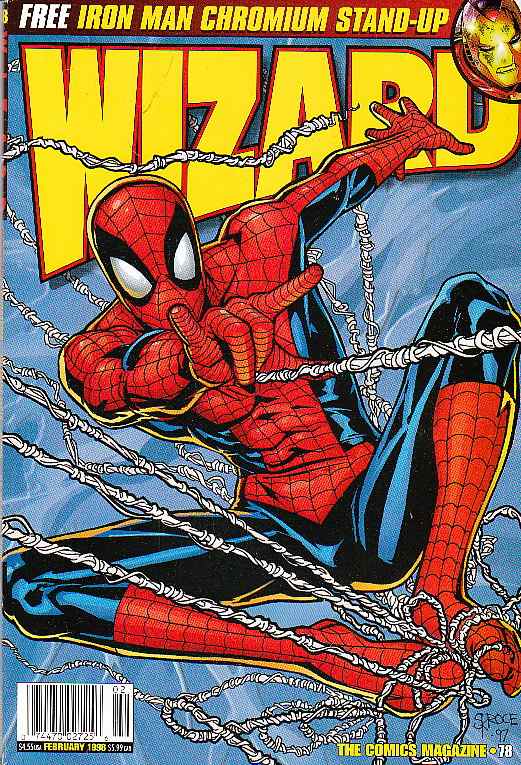
WIZARD’s staff demonstrated their love of Roger Stern’s AMAZING SPIDER-MAN, featuring seven clips from the run in the article. This isn’t the last time that happens. A later “Greatest Comic Book Stories Ever” list would include three Spider-Man stories, two of which were Stern’s. “The Boy Who Collects Spider-Man” was ranked #27, “Nothing Can Stop the Juggernaut” was ranked #7, and AMAZING FANTASY #15 was ranked #9.
In that same issue (WIZARD #105) they would declare Spider-Man to be the greatest comic book character ever.

For some reason, I’m guessing there will be attempts in the comments to apply the criteria to the current comics. Do you guys agree with what they said about the comics at the time? Do you think these are the appropriate ways to measure the Spider-Man comics? Is there anything there that isn’t important? Is there anything important that they left out? Are there things that have changed about how we should view the character in the nearly twenty (Yikes!) years since the article was published?

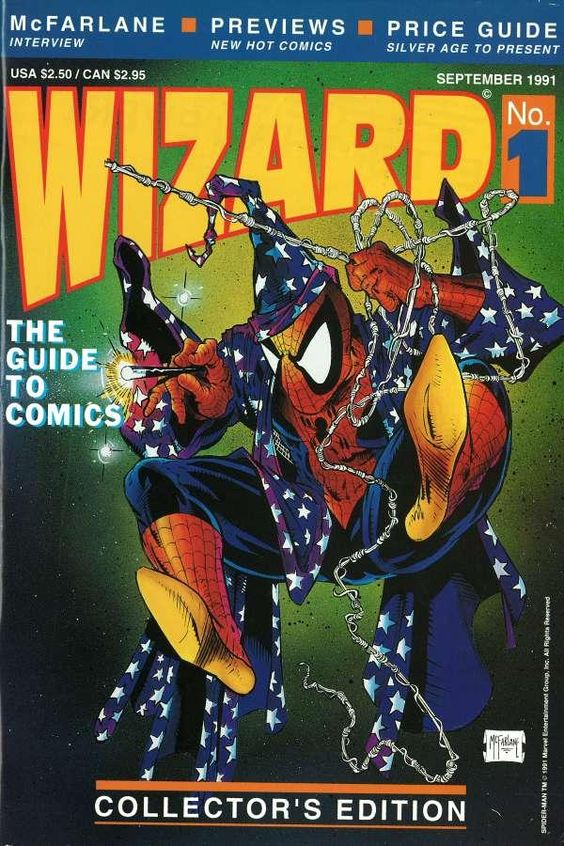

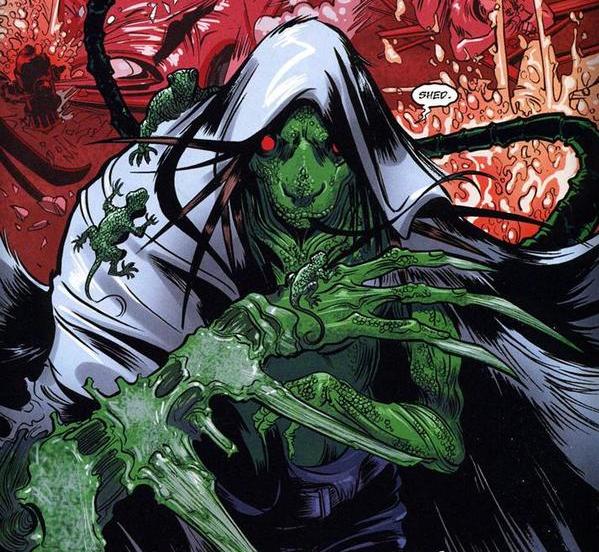
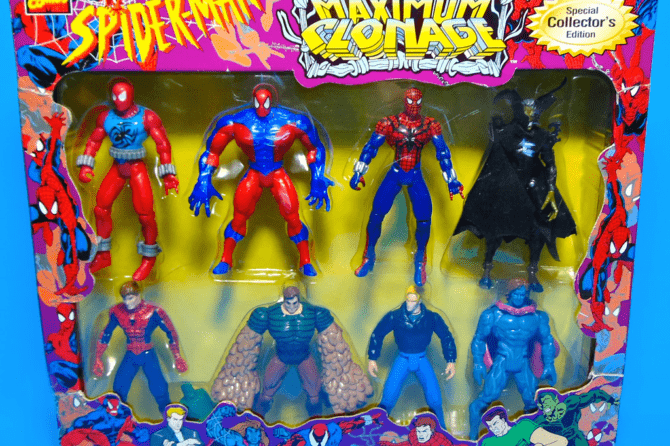
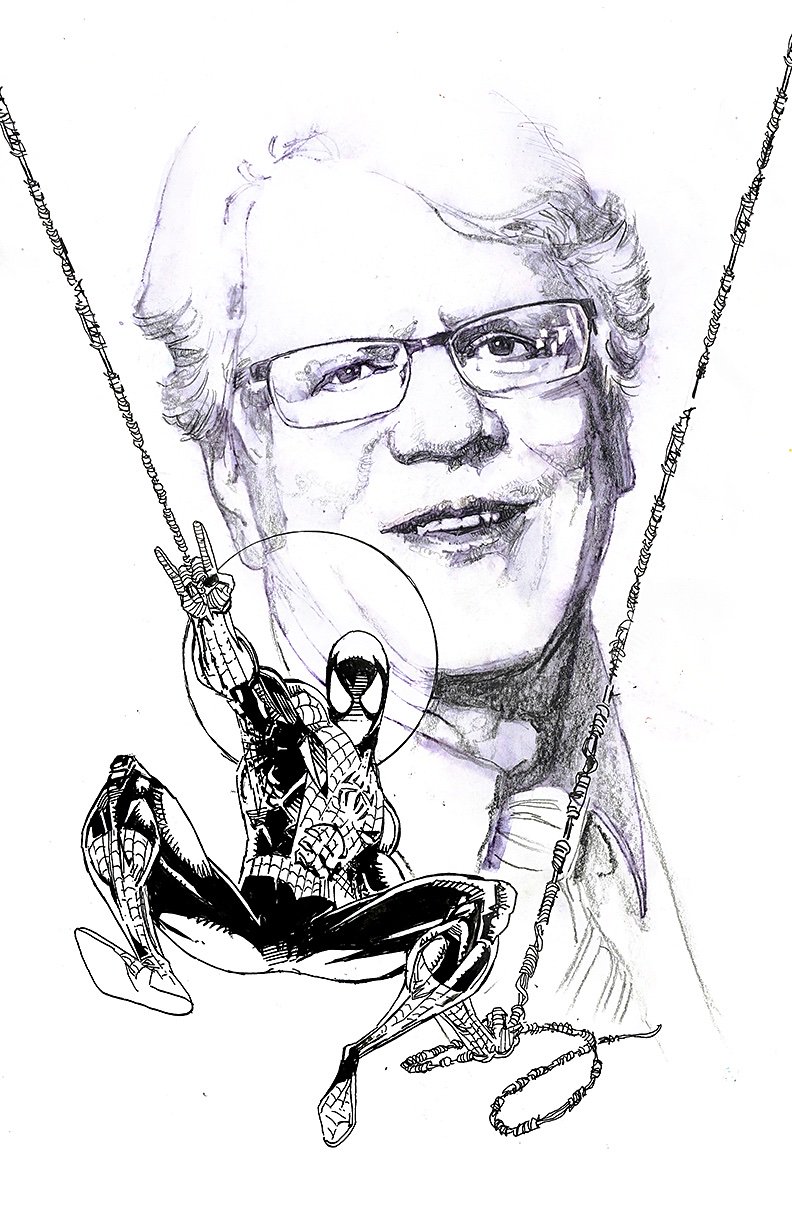





@Hornacek: I know, right? Also, I remember John Byrne said in an interview that he wanted to have Flint Marko hide in Rick Jones’ truck to let him have the same origin as Hulk for “Chapter One”, but he decided against it because then he’d have to be “the green Sandman”. You know, the same “green” Hulk who was originally GREY in his first appearance? Ugh. It’s weird to think that at the time of this article, the Sinister Six were in such different places: the Vulture had just become old again after being temporarily younger (which was lame IMO), Doc Ock had just been resurrected, Sandman was a good guy working with the Avengers and Wild Pack, Electro was working with the Rose (and without his trademark mask of his that I love, ugh), Mysterio had that weird redesigned suit with the gassy head, the original Kraven was (thankfully) still dead and Roderick Kingsley was returning as Hobgoblin. It wasn’t a perfect or definitive run for Spidey at the time, but I’ll gladly take the 1997-1998 pre-“Gathering of Five” run over the modern take on Spidey any day of the week.
@27 – Who could forget Captain Power? He/she got their power at the same accident where Peter got his powers. And Doc Ock. And later, Silk. Man, it looks like everyone that was there that day got superpowers!
I loved Wizard Magazine. I still have a bunch of them on a shelf in my room I read from time to time. However, I hated how much Wizard and Marvel disliked the Spider-Marriage and how they thought Doc Ock was Spidey’s lamest foe. Y’ know, the same Ock who tried to poison New York’s water supply, nearly killed Black Cat, almost married Aunt May and who Kingpin admits he’s afraid of. One of my main problems with the book in 1997 was how weird some aspects of the stories were. I mean, we had ninjas in “The Amazing Spider-Man” that helped resurrect Doc Ock and Black Tarantula somehow knew Joe Robertson, but we never found out how. Sure, it wasn’t Mackie/Byrne bad with M.J.’s faked death and “Who?” villains like Shadrac and Captain Power (yes, there was actually someone named Captain Power, and he was a lady), but still, I still bought and loved the post-Revelations/pre-Chapter One books at the time. I really miss these days where Peter and M.J. were a married couple in college, M.J. was studying psychology, Pete still worked at the Bugle, Peter actually had his supporting cast around, and Spidey was still a hero who acted responsibly. Call me when “One More Day” is undone, please. 🙁
#25:
Couldn’t agree with you more. Both resurrections were terrible mistakes, creatively. Now Norman is just another ineffectual boogeyman who pops up every so often to say “Boo!” but then incredulously gets away/allows Peter to get away. Meanwhile, Harry has served zero real story purpose and every time he is used, it just draws attention to how gutted Peter’s supporting cast has become since OMD and how much the book has gone downhill creatively since then.
Sorry Al, but I think the death of Norman was not a mistake. It added realism to the overall story when you continue to engage in such destructive behavior, eventually your number will come up. I agree that the Green Goblin was a GREAT villain, but how long can you continue to believe such a dangerous criminal would allow Peter to live? Resurrecting the character over 2 decades later just compounds the problem. His resurrection (along with Harry’s) is a mistake and neither character are currently creating any major or lasting impact on the series.
@#22: You say that but it’d be 3 hours well spent
@22
Hey Al, why don’t you write a longer comment next time so you can really get your point across? Maybe someday when I have 3 hours to kill, I may actually try to read it. LMAO
@#4: I think Peter’s identity does have to be a secret from the general population, but certain people absolutely can be in on it. Aunt may, MJ, Felicia, the FF, Captain America, Daredevil, Norman and maybe Venom are top of the list. I think of those MJ and Aunt May are the most paramount. MJ isn’t MJ if she doesn’t know and Aunt May isn’t interesting if she doesn’t know.
I don’t think his relationships need to be ‘unstable’ but maybe that’s me applying a personal definition of the term. When I say unstable I think dysfunctional. I think really it’s more that it should as you say have ups and downs that balance out realistic responses to the situations happening in the narrative but also just have ups and downs because that’s life. A lot of Spider-Man boils down to ‘it should be like this because that’s life’.
I don’t think Spider-Man should be rich. I think poor is maybe again misleading because he was hardly starving. Spider-Man should be like middle class at a push. At his age there should be financial stability of a fashion but not so much that it’s easy street. There should be stakes for him not earning money. My suggestion for years has been make MJ the breadwinner in a job which allows them to get by (like teaching or running a modest business) and then have Peter freelance or do part time jobs. His financial contributions will make a concrete difference but he isn’t so irresponsible that he’s seriously unsure if he’ll be able to eat any given month.
I think the costume is important because this is a visual medium. We shouldn’t have the ugly ass green light up thing Ross created. But I think the black one is unfeasible now because of Venom. At the same time though it’s not that big of a deal. I do think the red and blue though is honestly the best costume for him from a design POV and also evokes his character. It’s optimistic and friendly, but also doesn’t quite look human.
Well…not always. There have been a lot of occasions where he won just off the back of his sheer will power and grit. He didn’t outsmart his way out of the Master Planner Trilogy. That was all human spirit.
Oh, I absolutely think he needs to be in NYC. Put aside how he’s lived there and that’s where all his relationships exist, NYC is the perfect place for web slinging, changing outfits, and his attitude is reflective of New Yorkers as a whole
I think his moral code can be tested and be allowed to fail in certain small ways, which makes him human. He’ll never violate it in an unforgivable way. E.g. he should never kill someone consciously and deliberately unless it’s like a combat situation and he reacted in the heat of the moment or else did what was necessary from a survivalist POV.
I don’t think Spider-Man needs to be mistrusted by other heroes. One of the few things I liked about him becoming an Avenger was that it was a point of character development for him. Nowdays he should have friendships and trust with other heroes, but in his solo-titles he should absolutely be a lone hero outside the odd Black Cat or Daredevil team up.
To be honest, even putting aside my affection for the 1997-1998 status quo, I think Wizard was in this article far too critical.
I don’t think they are taking into account the context of what was and had been happening at the time or the fact that really, those books were okay. Not the best thing since Stan Lee but mostly between them they were fine.
@#14: Being ordinary, realistic and relatable was a key part of the orignal concept for Spider-Man, something that was attempted to be adhered to throughout the decades. It never WAS realistic or completely relatable of course but then we have to take into accounts the writing standards of each decade coupled with the requirements to make the story dramatic, entertaining and work within the superhero genre, not to mention maintaining narrative coherence as much as possible. Consequently what we wound up with was a kind of ‘relative’ realism and reltabilty for the character which nevertheless worked. I mean it would’ve been quite dull if 2 issues in he’d have just died of radiation poisoning. 😉
I think Spider-Man is relatable but that can be relative. I do think though he struck a chord because, in a relative sense, he was ordinary and much more like the average person and reader of the time. But he has personal qualities and experiences to him which are so common among most people that people from all walks of life key in on him. One female fan might relate to struggling to pay for rent. A certain black fan can relate to moving out of their parents home and making on their own in the real world. A gay fan who might’ve lost a parent could key in directly on Peter’s grief over Uncle Ben. And you could even go metaphorical with it.
Spider-Man doesn’t experience racism, but his persecution and criminalization by the media could be something some people who experience racism can key in on. Someone who isn’t male or heterosexual might relate in a metaphorical sense to the romantic complications of Peter’s life. For instance none of us have dated spandex clad costumed cat burglars (well Mark Alford of course), but how many people, male, female, heterosexual, homosexual, etc have had at least one relationship that was a trainwreck, that was with someone obviously not right for them but at the time they were just kind of caught up in for one reason or another?
This kind of metaphorical relatability is what led the late great Dwayne McDuffie to say he as a black man related to the Aryan looking Scandinavian God Thor “The blackest character” among Marvel’s original pantheon heroes. Or why the X-Men have been so successful across the board. They aren’t specifically about racism, or homophobia, but prejudice in general. Straight white people who don’t experience institutionalized prejudice can still relate to the X-Men as a whole even if they’ve only ever felt isolated in high school.
It is also I think part of why the MP Trilogy is so powerful. No one has lifted around 10 tons of machinery off their backs whilst being steadily submerged in water in a secret base beneath a river whilst time is running out for them to save their dying mother figure.
But when he lifts that stuff off his back it’s a metaphor for all the struggles and burdens and crap he has dealt with in the MP Trilogy and his life. And by extension it can and has been taken as a metaphor for the struggles and burdens we all have, great or small, because at one time or another we all feel buried by those. That machinery can be your school studies, your job, your love life, the fact that you get bullied, an illness you’ve been coping with, some kind of trauma you’ve experienced, a bereavement, anything.
But of course a character doesn’t need to be relatable to be successful. Wolverine and Batman are both almost relatable almost entirely on a metaphorical level. I personally speaking actually relate MUCH more to Wolverine and Superman than I do to Spider-Man but I just like Spider-Man way more.
Spider-Man for his part though was created more specifically with that in mind, but not too much of anything he went through (until 2006 t least) compromised that idea, at least not without being course corrected eventually or else being additive in some other way. E.g. it’s not relatable for most people to have had a hand in the death of your father figure, but that’s part of the drama, the pathos of the character. I think though because it’s so important for Spider-Man and so built into his concept writers should be careful about what they do and don’t institute. Something unrealistic can happen, or something uncommon but there are extremes which push things beyond the pale. For instance his mental breakdown about being a clone should never have happened and thankfully got course corrected soon enough. Or if you give him some kind of very serious and real traumatic life experience which is going to permanently/long term going to affect his life in very deep ways that most people aren’t going to be able to relate to. These types of characters can and should exist of course, and those elements can even be added into the mythologies of pre-existing ones, but it depends upon which ones and what you are adding in. For Spider-Man, again because a big part of his core concept was being (in a relative sense) ordinary and like most people in most ways, something like that shouldn’t be instituted lightly if at all.
@#15: I really disagree with the idea that Norman coming back was a mistake. Whilst death is important you have to weigh it against the other needs and requirements of the series. And for the superhero genre, well…you need good villains. And Norman was one of the best for Spider-Man and got even better after he came back. A good villain is worth their weight in gold so undermining this particular death wound up adding more than it took away. Aunt May’s death was the same once JMS actually did anything with her. Harry’s though has served no purpose but to enrich his and Norman’s relationship but at the expense of their respective relationships with Peter, who is of course the lead and therefore more important.
As for the article itself, Wizard seems to be a little disingenuous. It’s talking about the ‘recent attempt to reboot Spider-Man that failed’, but they neglect the fact that the shitty state Spider-Man sales were in at the time was largely BECAUSE of the reboot attempt. People did NOT react well to the idea of Spider-Man being a clone. They’re acting like the writers were on the right track back then and it just didn’t pan out. No, the attempt itself was toxic to the fandom.
Also it’s funny how dated this sentence is now “Forget Deadpool…Spider-Man should be the wittiest hero in all of comics.” Oh 1997…if you only knew what you were in for.
Anyway the gradings:
Sense of humour: Did Wizard read DeMatteis’ Spec Spidey run where we were getting very humerous stories like the Legion of Losers and the White Rabbit? Didn’t think so.
Secret identity: Wizard really needed to get over themselves. Secret identities are waaaaaaaaaay more interesting when a TINY group of people know it. E.g. Alfred, Robin, Barbra Gordon all knew Bruce Wayne was Batman and Batman not only outsold Spider-Man in the 1990s the quality was more consistent. More than that DeFalco’s and PAD’s Spider-Man runs in the 1980s made exceptional use of Spider-Man having a confidant and granted him you know…character development? Wizard’s perception seemed to negate that believing there was a definitive way it should be done and Spider-Man, like Batman or Superman, basically just stuck to a set status quo or elese went on temporary tangents from it. The truth was it was never like that. Spider-Man even under Stan Lee only ever stopped moving forward to enjoy the status quo they’d reached at that point. Outside of stuff like the clone saga or cosmic powers thing it wasn’t like Spider-Man just stayed a set way. He evolved organically as all the BEST characters do, keeping true to his roots but building himself up. It’s the reason why Stern’s Spider-Man LEFT full time education.
Plus Spidey can have a burden on him but still have a release mechanism because THAT’S more realistic and relatable, which is a part of his core concept. It was rewarding and refreshing seeing him actually get to unload this crap.
As for the ‘golden rule’ being Peter and Spidey’s lives were seperate…lol…no. There was only ONE life and Peter just lived in different sides of it. But they often collided headlong and stuff from one impacted on the other. Or what else would one call Doc Ock lodging with Aunt May, Norman Osborn being his best friend’s Dad and his worst enemy and J. Jonah Jameson giving him shit as Spidey and chewing him out as Peter Parker as well? Spider-Man was actually MORE interesting when those two sides of his life bled over.
“Why bother calling it a secret identity” idk because the majority of people DON’T know it maybe?
Unstable relationships: Yeah being Spidey has a price…that didn’t change in 1997. He still missed dinner dates with MJ. He still was a bad friend to Billy Walters. His grades still slipped. He still couldn’t spend as much time with Aunt May as he liked.
Also Peter and MJ were not seeing a marriage counseller in 1997. They were getting counselling due to the miscarriage.
Mary jane isn’t his one unstable relationship just his one unstable romantic one, but he’s ALWAYS had to manage ONE romantic relationship at a time outside of a few issues in the 1980s because he’s monogamous.
Death: Yeah no. Norman Osborn’s death has never haunted Peter Parker. Gwen’s death did. He really didn’t give much of a fuck about the pos murderer of his girlfriend dying. His resurrection was not only a very good story but gave the superhero Spider-Man, you know…a great super villain to fight…which is kind of a big point of the character…And Norman never once said he was ‘recovering’ from his injuries. He was fine shortly after the glider hit him.
As for death meaning death lol…how many times by 1997 had Joker come back to life? Resurrections are fine if they are JUSTIFIED, just look at Bucky’s resurrection or MJ’s resurrection after she was fridged in 2000. Death shouldn’t be done lightly but when it’s additive to reverse gears then so be it. Case in point it’s asinine to criticise Doc Ock’s resurrection because his death was so stupid in the first place and should never have happened.
Also Wizard were really reaching when they said Kraven’s son was ugh worthy or that it resurrected Kraven. Sergei Kravinoff was Kraven the Hunter. He was dead. He remained dead. That by any rational point of view isn’t a resurrection. And his son Alyosha was frankly a way more interesting character who didn’t cheapen Kraven’s death because HE WASN’T KRAVEN.
Youth: “Peter Parker is a single guy in his mid-20s” Except for when his co-creators wrote him as a teenager who was only single for like 7 issues and then for 8 more issues before Romita showed up and soon he was casually dating MJ and then seriously dating Gwen for like 40 issues of Stan’s run, 10+ issues of Conway’s run and then he was dating Mary janefrom 1974-1980 and then he was singlish but dating around and seeing Cissy Ironwood semi-regularly and then seeing Deb Whitman, and then Felicia, and then mary jane again. Yep a single mid-20s guy sure is the default Spider-man Wizard.
“Odds are most comic fans are young and single”. Lol nope, there was much more variety for comic fans even back then. That is only directly connecting to a certain segment of the fanbase, not the majority. In fact a lot of fans were either kids like myself coming in from the cartoon who could not relate to Spider-Man but look up in idolization of him or else were older fans like a certain someone from a certain podcast. Even the article outright says “aspire to live alone” If they’re aspiring to live alone but reading about a guy actually living alone that isn’t relating that’s idolizing. That’s like a 5 year old wanting to be like a high school student.
“Most fanboys could probably relate to Peter’s pre-marriage social life” Yeah, did we do a headcount to confirm that? What about the many fanboys who were in stable relationships? What about the fangirls?
And beyond that please tell me how directly relatable it was that said fanboys would date the pretty teen secretary of the millionaire media mogul whilst they were in high school, THEN date the beauty queen of a high school in college who was also affluent, the talk of the campus and the influential daughter of a respected public figure, who was competing for his affection at the same time as a jaw dropping aspiring actress and model who rarely spoke without flirting, and then later in life encountering a cat burglar in skintight black spandex who was very upfront about how she was his fangirl and wanted to sleep with him, who later competed with aforementioned aspiring actress for his affections. And in between he drew attention from three typically attractive women who lived next door to him and loved to sunbath topless on his roof and flirt with him.
Look, I think you can take some of Peter’s romantic life as relatively relatable in a metaphorical sense or if you don’t apply absolute direct realism, but lets be honest a lot of it had to do with wish fulfilment, as did countless other comics with male leads. The Roger Stern panel posted that’s actually UNUSUAL for Spider-Man. It’s played off as if that happened all the time but it really didn’t.
“Peter is married and has an unborn child this gives him the impression of being older than he actually is”: In 1997 Peter Parker was 28 years old and had been married for just over 2 years. That makes him older right? No one 28 in 1997 was married. “Spider-Man suddenly has no connection to the average comic fan” Except for all the ones he did have a connection to who didn’t mind him being married because that was something real, they knew married people and of course many of them were married or else in stable relationships. By this logic Peter ever dating anyone is unrelatable. Even if you aren’t married though many comic fans have or will have romantic relationships of some kind and can thus relate in some way to him being married, even though being married is of course different.
But the marriage is a case of where his evolution and development as a character kind of circumvents the need for him to be relatable in that particular way. Besides, I maintain Spidey can be unreltable to some people so long as he remains true to his core concept of being relatively realistic and ordinary. And it’s relatively realistic for most people to get married eventually.
“There might be light at the end of the tunnel with plans for Peter and Mary Jane to seperate. Possibly by divorcing.”: Because if being married with a miscarried child ages Spider-Man to much divorce sure as Hell won’t! I hope they really enjoyed how those ‘plans’ turned out courtesy of Mackie and Byrne. Almost as much as they enjoyed that stillborn baby and it’s ‘ugly head’ (classy choice of words there) getting 150 issues of a solo series which wasMarvel’s longest lasting solo-female series.
He’s poor: “he NEVER has money” except for ASM #2 when he got enough money to pay off the bills on Aunt May’s home for a year.
It was at this point reading this article that I honestly wondered if they actually read the goddam books.
In 1997 MARY JANE WASN’T A SUPERMODEL! She was a psychology student and she and Peter were so hard up for money they could only afford to live in Aunt May’s paid off house with Aunt Anna as well. They weren’t dirt poor but they weren’t problem free. ASM #422-423 literally has Peter walking away saddened that Robbie will not give him any freelance work. In the clone saga Peter felt deep shame at being made redundant as a staff photographer since it meant he had failed to be a good provider for his family.
And what was with this “being married to a supermodel must have perks even if she doesn’t currently have a job”??????? If she doesn’t have a job she isn’t bringing in money so they don’t HAVE money. She’d been blacklisted from the industry since the late 1980s and never recovered from that beyond maternity modelling which obviously went south when she was no longer pregnant.
The supporting cast: “They exist to give him worries and be interesting themselves” And you know…give him realistic friendships and relationships. And to support him as a person.
How the Hell could anyone reading Spider-Man in 1997 say Mj is his exclusive support when there was a whole goddam subplots about Robbie, Jonah, Ashley Kafka, John Jameson, Billy Walters, AND the Stacys? Oh and you know…Flash’s alcoholism. Yeah….just MJ…clearly. He clearly doesn’t see those people all that often.
Oh and ‘self-pitying alcoholic loser’ is another classy choice of words there.
As for the ‘error’ in replacing May with Anna? What error? May did fuck all until she died and until JMS revamped her. Anna on the flipside was EXACTLY like Aunt May beyond not having fainting spells, having Peter fawn over her like a manchild and had an interesting backstory as a failed actress who cheated on her first husband.
And Wizard can speak for themselves. Flash’s alcoholism was a profoundly powerful storyline that made plenty people care hence what we got today with Agent Venom.
The costume: What are they even talking about with this one? Beyond the black costume and Spider-Ben outfit Peter’s costume only changed when he went Captain Universe or Armoured up which were one off things. They’re treating the Spider-Ben outfit as though it happened when Peter was Spider-Man but it wasn’t Peter, same thing with Scarlet Spider, that wasn’t Peter. It was a whole different character;. And besides Spider-Ben’s outfit from sensational Spider-Man #0 (not #1) was awesome. But not as awesome as the black costume.
Oh no, Spider-Man won’t be wearing the classic costume for ONE story arc which is obviously never going to last! I wish they could see the crap we’ve had to put up with for volume 3
And what is this ‘past failed costume updates’ bullshit? The black costume was so beloved THEY BROUGHT IT BACK AFTER THEY GOT RID OF IT. Spider-Man wore that thing for FOUR years before Venom showed up. practically everyone loved it.
Depressed optimist: Yeah no. Peter has his ups and his downs. He doesn’t always keep his chin up and a testament to that is, idk…Amazing Fantasy #15…the death of George Stacy…the death of Gwen Stacy…people dying in general really. Plus how many Ditko issues ended on melancholoci notes? Spider-Man HAS to be capable of not seeing the bright side all the time and HAS to run the risk of honestly being shattered by failure or else there are no stakes and he isn’t human or realistic like he’s supposed to be.
“Peter Parker is a lovable loser” Who had almost half of his Ditko era issues end on not-so-sad/outright wins. He isn’t a loser, he’s just human.
“There aren’t any problem for Peter to overcome” Except for his vertigo brought on by Morbius from that era. And his shaky marriage is ALL there is. Oh noes.
The villains: I love Spidey but…Batman honestly has a better rogue’s gallery.
What I love about this entry is that is says the villains are really important and the best in all comics but then says that it sucks that 2 two best ones got brought back to life. Which was it then?
Also ELECTRO was also around at that time and being a bad ass. Hobgoblin had just returned in a mini-series.
And again, I really question whether Wizard READ the stories in question. Lady Ock did NOT hate Spider-Man or was out for revenge against him for something he didn’t do. She was basically a scientist villain like Doc Ock except she had serious issues with her father and was female. She didn’t like Spider-Man but she never blamed him for Otto’s death. Something Wizard would know if they knew anything about Kaine who KILLED Doc Ock precisely because he LOVED Spider-Man and wanted to protect him. Kaine hated BEN REILLY for very deep and twisted psychological reasons.
Environment: “Peter doesn’t hang out at the Bugle or ESU all that much anymore” Except for all those times he did in 1997. Again, they should’ve read the damn books.
I grant you more could’ve been done but jesus Christ at this point in time it’d been LESS THAN A YEAR since the Clone Saga ended. Give them a damn chance willya.
Ethics: Well…yes and no. Mostly yeah I agree with everything said but…there have been times Peter has not saved EVERY life possible or else has taken life. often under totally justified conditions. His actions led to the death of the Finisher in ASM Annual #5 but that was a live-or-die situation. He also tried to kill Norman Osborn more than once, which in understandable because for him Peter woldn’t see any chance at redemption, so screw him.
Whilst one of those times was in the referenced “He threw bombs at the green goblin” thing, remember Peter just saw this dude come back from the dead after a glider impaled him and after the Goblin murdered his brother. He probably knew he would survive it but was also understandably angry.
The Future: Again, I sure hope they enjoyed that golden aged future they got with Mackie and Byrne. I’d never read a Wizard article on Spider-Man before. Now, honestly…I’m not all that sad they folded shop and disappeared into the ether.
P.S. as for their last article on the page…when did Peter ever stand up someone on a promising first date? No really I’ve never seen that in a comic.
@ #18 mmmmm….creme eggs!!!
@17 – Who would name a butler Cadbury? That’s an egg’s name.
@ #14 You do realize there’s a poor little rich boy with a butler around?
Yeh, I do mean Richie Rich!
@#8- It’s great that they like the Roger Stern era.
That doesn’t mean that if Spider-Man ISN’T like the Stern era, it’s inherently bad. Which is what Wizard argued on multiple occasions with how they insisted Spider-Man “should” be.
Overall, I agree with Wizard on the overall topics of what makes Spider-Man great. However they set out to list 10 strengths, but included a total of 13. I would drop Youth, Environment (redundant with Supporting Cast) and Secret Identity as being core to the 10 most important aspects of the character.
1. Sense of Humor – Important. #4 Mark Alford said it best, “He makes the jokes. He’s NOT the joke.”
2. Secret Identity – Not Important. What is important is not who knows, but how realistic it is portrayed. Having a few know, is OK.
3. Unstable Relationships – Important, to a point. Showing how relationships can be confusing, complex and create misunderstandings is human. This can be achieved as a single or married character.
4. Death – Very Important. Bringing back Norman was a mistake, compounded by bringing back Aunt May. Writers should treat this with respect instead it is treated mockingly as a “comic book death”.
5. Youth – Not Important. One of my favorite things was Peter grew from the very beginning of the Lee/Ditko run. It reached new heights with JMS.
6. He’s Poor – Somewhat Important. Gives the impression of the “everyman” aspect. Have Peter be a globetrotting CEO? Fail.
7. Supporting Cast – Very Important. All great series, stories, etc. typically have great casts.
8. The Costume – Somewhat Important. Can be used for comedic effect, (ruined in the wash) introducing technology/smarts, or just different. Is it KEY to the character? No.
9. The Depressed Optimist. Very Important. It is who he is. Teen angst leads to adult uncertainty about what is right.
10. He’s Smart – Very Important. When Peter is shown as being easily misled, immature or has not learned from past mistakes is when they are no longer writing Peter Parker.
11. Rogues Gallery – Very Important. One of the reasons I prefer Spider-Man over any other hero.
12. Environment – Redundant. Goes hand in hand with supporting cast.
13. Unwavering Ethics – Very Important.
What’s missing? Not much from how they defined Spider-Man. The only thing I could think of was “Respect of Continuity”, but that is not a character trait. The thing that used to make Spider-Man great was up to the Clone Saga, the writers seemed to have a higher degree of staying true to that respect. The Death section is touched upon as violating what came before, but I wonder what they would have written after One More Day and OMIT?
Overall, good find…I leave it up to others how they would grade the current series on how it stacks up.
What is this obsession with”relatable” and “just like comic fans?!” Marvel still references it with regards to Peter Parker.
Since when do characters have to be just like the audience to find an audience?!
This supposes that, for one, no female reader could possibly ever want to pick up Spider-Man.
And let’s look at other characters who have stood the test of time:
Harry Potter: so I guess the only people who could possibly want to read Harry’s adventures are English teenage boys who go to fancy prep schools.
Han Solo: only thirty-something men who smuggle illegal substances and have bounties on their heads.
Superman: only aliens sent from their destroyed planet to Earth as a baby.
Batman: only poor little rich orphans with butlers.
Sherlock Holmes: only Victorian bachelors
Buffy Summers: only teenage females who live on top of a Hellmouth
The Doctor: only time travelers
Mr. Spock: only half-human/half-Vulcans
In other words, I’m really, really sick of this canard.
People relate to Peter because, when written well, he’s a sympathetic, three-dimensional character with both heroic traits and flaws, who struggles to do the right thing even when it might cost him personally. We are drawn into his world, and we like spending time there. And that’s why he’s popular.
@11 – In what world is the BND run anything like Stern’s run?
@#11 “Uneven”. Well, that’s a new way to spell “awful” 😉
@2: they tried a redo of the Stern era, it was called Brand New Day, and it was extremely uneven.
@ #3 And let’s don’t forget Frank Miller called WIZARD “the enemy”.
Is it too late to clone Lee and Ditko?
I agree with poster #3.
@#2- There are two reasons I think they really like Stern’s run. Part of it comes down to the age of the writers. Someone who was in his late twenties/ thirties in 1997 probably read Stern’s run in their formative years, so they’re going to have a soft spot for it. It’s also among the best templates for a Peter Parker who has been Spider-Man for a while, which would be the likely approach of any creative teams.
@#4- This was years before Spider-Man became a member of the Avengers, so they might not have thought too much about Spider-Man’s place in the Marvel Universe.
Wow, the Wizard article basically gets everything right. Now we have a rich CEO Peter Parker who is pushing 30 with a legion of people who know his double identity, who is often portrayed as a man child, who has a supporting cast that outshines him on a consistent basis, and has “unwavering ethics” which include nearly killing a girl so Doc Ock wouldn’t know he was still “alive” somewhere in his own brain during Superior. Never mind all the knock off characters also using the name “Spider-Man.”
It’s like Marvel saw this article and said, “This is what has made Spider-Man so successful for 35 years. Let’s not do that.”
I have to agree wholeheartedly with that Wizard article. Hell, it’s almost like I wrote it myself.
Oh, and RDMacQ, Spider-Man can ONLY be one way, or then he’s not really Spider-Man anymore, now is he?
I don’t consider whatever the hell that is running around in ASM these days to be Spider-Man in any way shape or form. It’s like some weird alternative reality or a What-If imitation version of the character. (And a pale imitation it is). He is “Spider-Man” in name only. Kind of like Deadpool was in “Wolverine Origins”.
@2 – “The article can basically be summed up as this: ‘Just do the Roger Stern ASM era again.'”
Exactly!
Oh wait, you meant this as a bad thing.
I do think it is fair to apply some of this to current standards. The character of Spider-Man has certain attributes that makes him who he is. Here’s my run down of Wizard’s take:
1. Humor – must have. I think they nailed it with the “witty” and “clever” descriptions. He makes the jokes. He’s NOT the joke.
2. Secret Identity – makes good stories? Sure. A must? Nah. JMS’s run was odd, but the interaction between Peter, MJ, and Aunt May and their knowledge of the identity was fantastic. What Peter David did when Parker unmasked in Civil War was brilliant. The dual identity is key, but not the secret part.
3. Unstable Relationships – as much as I hate to say it, I agree with that one although I do nt mean that it must mean that he cannot be married. It just means there would always be ups and downs.
4. Death – Amen!
5. Youth – Nope. It is o.k. for the character to grow.
6. Poor – a key part of the stories, but I don’t think it necessarily defines the character. He does seem to work better struggling for money, but put him in the hands of the right writer and I think he can be rich and still be Spidey.
7. The Costume – While fans prefer the classic, I think he can work in other costumes (the black costume worked, for instance). The character makes the costume, not the other way around.
8. Supporting Cast – Yes! ‘Nuff Said.
9. He’s Smart – Ever since the Lee/Ditko days, it has been his clever way of thinking that wont he day over powers.
10. Depressed Optimist – probably a good way of putting his philosophy.
11. Rogues Gallery – a hero is only as good as his opponent. And vice versa too.
12. Environment – Maybe not just New York, but he does fit a street level environment.
13. Unwavering Ethics – yes, but it shouldn’t be the driving point of the story. I’ve read too many stories where his moral code seemed to be the driving force, not the character living up to the code. “No one dies” comes to mind.
What did they leave out? – Loner. Spider-Man works best alone, not quite trusted by the other heroes. IMO.
However, int he right hands, a writer could break all of those and still make us believe it.
@1 – “Uh-oh.”
Note that Stegron is still around and Wizard Magazine is not… 😎
The article can basically be summed up as this:
“Just do the Roger Stern ASM era again.”
Wizard was extraordinarily biased towards that era of Spider-Man, having several Roger Stern penned tales on their “Best of all time” lists when it came to Spider-Man (Two of them- the Cobra/ Hyde story and Nothing Stops the Juggernaut- aren’t nearly as good as they make them out to be, in my opinion). The CBR retrospective of the series called it in one article a “Near sexual obsession” with the run.
Not to say that they don’t make good points on some areas. However, a lot of their interpretation just seems to insist that Spider-Man can be one way and ONLY one way.
“… or D-list losers like Stegron …”
Uh-oh.